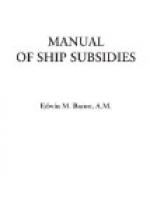* * * * *
Belgium had a subsidy system for shipbuilding before 1852. At present neither bounties to domestic shipping nor postal subventions are paid by the Government. Subsidies, or premiums, however, are given to certain foreign steamship lines to encourage the commerce of Antwerp. These include an annual payment of eighty thousand francs ($15,440), and the refunding of lighterage and pilotage dues, to the North German Lloyd on their East Asiatic and Australian lines; and fifteen hundred francs ($289.50) to the German-Australian line for each call to and from Australia, the maximum subvention limited to thirty-nine thousand francs ($7527). A Danish steamship concern is also exempted from lighterage and harbor dues and granted other facilities, but receives no money premiums.[DB] Belgium tonnage in 1910 comprised only 165 steam and sailing ships for a total of 299,638 tons.[DC]
FOOTNOTES:
[Footnote CZ: Meeker.]
[Footnote DA: Lloyd’s Register, 1910-11.]
[Footnote DB: Meeker.]
[Footnote DC: Lloyd’s Register, 1910-11.]
CHAPTER VI
AUSTRIA-HUNGARY
The Imperial Government of Austria-Hungary spurred by the action of Germany, instituted a direct subsidy system, also modelled after that of France, in 1893, when the Austrian merchant marine was languishing.[DD]
A postal subsidy had long been in operation, the subsidies being all awarded to a single steamship company—the Austrian Lloyd, earlier the Austro-Hungarian Lloyd. They were practically mileage and speed bounties,[DE] increasing with the extension of service. Ten-years’ contracts were at first made with this company. The contracts, executed in 1888, particularly guarded domestic interests. In the purchase of materials it was required that preference be given to Austro-Hungarian industries. The coal used must be bought from Austro-Hungarian subjects in the proportion of two tons from Austria and one ton from Hungary, provided that “the price is not greater than foreign coal, and that the steam-producing power of the native coal is equal to at least eighty-four per cent of that of foreign coal.” In the building and repairing of their ships, or parts of ships, and engines, the company must also favor home interests. Ships, engines, or boilers could be ordered abroad only with the consent of the foreign office when shown that the work cannot be made in Austria within proper time, or that the want can be supplied by a foreign country on more favorable terms.[DF]




